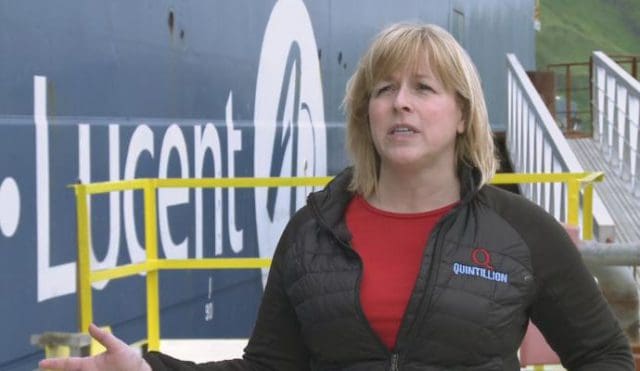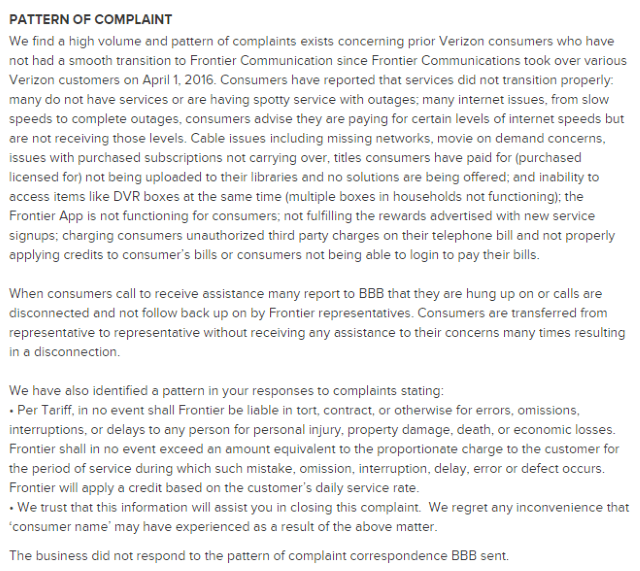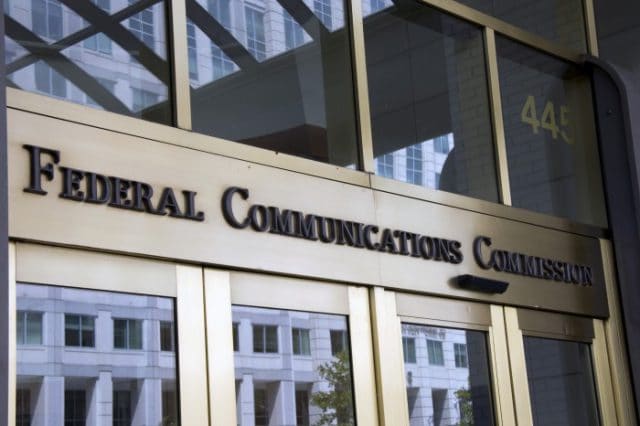 Stop the Cap! today filed recommendations with the New York State Department of Public Service suggesting Charter Communications face additional sanctions in New York State if it is found once again to have missed its rural broadband buildout commitment, agreed to as a condition of its merger with Time Warner Cable.
Stop the Cap! today filed recommendations with the New York State Department of Public Service suggesting Charter Communications face additional sanctions in New York State if it is found once again to have missed its rural broadband buildout commitment, agreed to as a condition of its merger with Time Warner Cable.
New York’s Public Service Commission has accused Charter/Spectrum of using invalid or unqualified addresses to pad the number of new passings the company is required to achieve each quarter in its latest agreement with the Commission. As a result, the PSC is considering imposing a $1 million penalty and New York City officials are considering franchise revocation proceedings.
“In upstate New York we are focused on rural broadband and our recommended sanctions seek relief for the 75,638 homes and businesses that are going to be saddled with satellite internet access as the state’s rural broadband expansion program winds down,” said Stop the Cap! founder and director Phillip M. Dampier. “We believe Charter should be compelled to make good on disqualified addresses by expanding service to an equal number of customers that are currently assigned to get HughesNet satellite internet instead of true broadband service.”
Under Stop the Cap!’s proposal, Charter would be given a list of all census blocks assigned to satellite service and be required to buildout to many of those homes and businesses, particularly those just 1-2 miles away from existing Charter infrastructure.
 “Some western New Yorkers are livid because Gov. Andrew Cuomo repeatedly promised to ‘fulfill a goal of providing access to high-speed internet to every New Yorker in every corner of this state,’ and offering them satellite internet service breaks that promise,” Dampier said.
“Some western New Yorkers are livid because Gov. Andrew Cuomo repeatedly promised to ‘fulfill a goal of providing access to high-speed internet to every New Yorker in every corner of this state,’ and offering them satellite internet service breaks that promise,” Dampier said.
The New York State Broadband Program Office’s last round of awards failed to attract bids from providers for the 75,000+ affected homes and businesses. Because the awards program requires providers to pay a significant portion of expansion expenses, with the rest subsidized by the state, these rural addresses were effectively orphaned.
“It appears the state is giving HughesNet $15,426,269 of taxpayer funds to allow the governor to declare ‘rural broadband victory’ — money Hughes will use to discount satellite dish equipment and installation expenses — something it already does out of its own pocket in its marketing campaigns,” Dampier said.
Hughes will charge grant-funded users no more than $60 per month for the next five years, and no more than $49 for installation. But HughesNet’s website shows new customers are given installation for free, and without more information it is hard to discern what each customer will get for around $60 a month. The website shows a satellite plan costing $49.99 a month that includes just 10 GB of usage per month, with a 24-month commitment. A 20 GB plan costs $69.99 a month with the same commitment. Customers also have to pay $449.98 to own the necessary equipment or a one time fee of $99 + $14.99/mo to lease it.
 “Satellite internet is not broadband and while it is a useful tool for those living in extremely rural areas, it should not be the only answer for a customer who has neighbors with Spectrum cable service just a mile or two down the road,” Dampier added. “We feel Charter could be an important partner in achieving 100% coverage in New York, if they are compelled to act.”
“Satellite internet is not broadband and while it is a useful tool for those living in extremely rural areas, it should not be the only answer for a customer who has neighbors with Spectrum cable service just a mile or two down the road,” Dampier added. “We feel Charter could be an important partner in achieving 100% coverage in New York, if they are compelled to act.”
Stop the Cap! is also recommending a statewide audit of the “new passings” Charter is claiming towards its rural broadband expansion commitments. The group also wants the state to spend the proceeds of the proposed $1 million fine towards further broadband expansion for would-be satellite customers.
“There is no reason to believe Charter is only counting unqualified addresses downstate, so there needs to be a statewide audit,” said Dampier. “The governor made an important commitment to rural New Yorkers and we want to see him keep it to as many people as possible, with Charter picking up more of the costs. It is the least they could do after paying their CEO Thomas Rutledge $98 million after successfully completing the merger deal.”
Submission Follows:
April 5, 2018
Hon. Kathleen H. Burgess
Secretary, Public Service Commission
Three Empire State Plaza
Albany, NY 12223-1350
Dear Ms. Burgess,
In reference to the proceeding 15-M-0388 and 18-M-0178, in which the Commission proposes to disqualify more than 14,000 New York addresses shown as “newly passed with broadband services,” we offer our views about Charter Communications’ buildout performance and make recommendations about possible additional penalties and sanctions that should be considered by the Commission if Charter Communications is found to be in violation of its agreements.
Need for Statewide Audit
If Charter Communications is found to be in violation of its commitment and agreed-upon timetable to expand broadband to 145,000 new homes and businesses, there is no reason to believe addresses miscounted in New York City represent an isolated incident. Indeed, the Commission has already seen fit to impose sanctions against Charter Communications for missing its buildout commitments, and should the Commission now find Charter to be out of compliance once again, it appears the Commission’s earlier threats of forfeiture were not compelling enough to ensure future compliance.
Stop the Cap is concerned that Charter’s counting of invalid or disqualified addresses towards its 145,000 new passings commitment may not be limited to the New York City area.
In Erie County, Charter claims to have completed 4,357 passings, including the City of Buffalo, the Towns of Angola, Eden, Grand Island, and the Village of Williamsville.[1] In Monroe County, Charter claims to have built out service for approximately 3,395 passings, including the City of Rochester, and the Towns of Perinton, Greece, Webster, Gates, and Henrietta. These are remarkable numbers in counties that have shown almost no population growth[2] or dramatic upswing in new major new housing developments.[3] As a result, we urge the Commission to carefully audit Charter’s buildout reports for possible evidence that, like in New York City, there may be a number of unqualified or invalid addresses in upstate New York as well. In fact, the Commission should, at the least, undertake random audits of each report claiming new passings to verify compliance.
Proposed Sanction: Charter should prioritize “make-up” buildouts to reach New York addresses currently assigned by the New York Broadband Program Office to Hughes Network Systems, LLC for satellite-delivered internet access.
Despite efforts by Gov. Andrew Cuomo and the “New NY Broadband Program (NNYBP),” the state’s Broadband Program Office (BPO) has identified at least 75,638 New York locations[4] that will be offered substandard satellite internet access from Hughes Network Systems, LLC.[5] This option is considered a last resort for addresses Charter and other providers have refused to service, despite the potential of funding available during Round III of the NNYBP awards.
Hughes cannot guarantee access to 25 Mbps service 24 hours a day across its New York footprint[6], meaning these locations will not be guaranteed broadband service.[7] The company has also confirmed it will impose a low data usage cap that, when exceeded, reduces broadband speed to well below anything approximating true broadband service.[8]
The decision to supply satellite service instead of wireline internet access may permanently leave these residents and businesses disadvantaged with inferior internet access, with little incentive or a compelling business case for other companies to buildout to these locations, especially after Hughes receives a state subsidy to reduce its service and installation expenses.
While satellite access may indeed be the best available, last resort service for some extremely rural and inaccessible locations in isolated parts of New York, there are many examples of residents living in census block areas now assigned to Hughes Network Systems that are very close to existing Charter service areas.
One example is Mr. Matt Stern, [redacted], Middleport, N.Y.[9] His Niagara County census block has been identified in Round III of the NNYBP expansion program as 360630240013000. That census block has been assigned by the BPO to receive Hughes’ satellite service because Verizon does not offer DSL at his address and Charter did not bid to serve Mr. Stern’s immediate neighborhood because he lives 1.3 miles away from existing Charter facilities. As a result, Mr. Stern is exploring selling his home and moving out of state because his school age children lack internet access.
Should the Commission find it reasonable to strike more than 14,000 addresses from Charter’s latest buildout list, we respectfully recommend the Commission sanction Charter by requiring it to make up the disqualified addresses starting with locations like Mr. Stern’s, currently assigned to get satellite internet service.
Although costlier than counting business parks or new housing projects as new passings that Charter would have likely serviced with or without its commitment to New York State, this sanction will deliver real benefits to many location-disadvantaged rural New York residents and businesses tantalizingly close to existing wired broadband networks, but unlikely to get true broadband service any other way. The Commission can develop a formula to identify addresses in census blocks that are located within a reasonable distance (perhaps 1-2 miles) of existing Charter facilities to keep expansion costs reasonable.
Sanction Proposal: A portion or all of the forfeiture penalties collected as a result of Charter’s alleged missed targets should be devoted to a further expansion of wireline broadband service to areas currently assigned to Hughes Network Systems, LLC.
Drawing $1,000,000 from the letter of credit to penalize Charter Communications for missed targets will, by itself, not bring broadband service to areas that were originally promised true broadband service by Gov. Andrew Cuomo’s NY Broadband Program.[10]
Instead, 75,638 homes and businesses will be offered satellite service that cannot guarantee to consistently meet the FCC’s definition of broadband: 25 Mbps download and 3 Mbps upload speed. In contrast, wireline providers like Charter Communications have committed to offer 100 Mbps service with the option of gigabit speed by the end of 2018.[11]
These locations assigned satellite service attracted no bidders in the final round of the NNYBP awards. Therefore, there is little chance a wireline provider will extend service to these locations without additional subsidies.
By allocating some or all of the proceeds from fines or forfeitures to an additional buildout subsidy program limited to locations currently assigned to satellite internet service, the costs to wire at least some of these census blocks could be more tolerable to wireline providers around the state.
The shared goal by all concerned is to bring 21st century broadband internet access to every New York home and business. It is our view that Charter’s alleged failure to meet its obligations to New York after getting approval of its multi-billion dollar merger with Time Warner Cable, offers a unique opportunity to compel Charter to share a small amount of the company’s overall revenue towards resolving the urban-rural broadband divide, while at the same time gaining new customers and additional revenue as a result of these service expansions.
Yours very truly,
Phillip M. Dampier
Director
[1]15-M-0388 – Charter’s Build-Out Report – January 8, 2018
[2] New York Counties Population Measurements (https://bit.ly/2Emx4dS)
[3] Year 2017: https://www.census.gov/construction/bps/txt/t3yu201712.txt; Year 2016: https://www.census.gov/construction/bps/txt/tb3u2016.txt
[4] http://stopthecap.com/wp-content/uploads/2018/04/phase_3_awarded_census_blocks_3.xlsx
[5] https://nysbroadband.ny.gov/new-ny-broadband-program/phase-3-awards
[6] “Stated speeds and uninterrupted use of service are not guaranteed. Actual speeds will likely be lower than the maximum speeds during peak hours.” Part 1.1 HughesNet Subscriber Agreement: http://legal.hughesnet.com/SubAgree-03-16-17.cfm
[7] http://www.adirondackdailyenterprise.com/news/local-news/2018/03/hopeful-skeptical-about-broadband/
[8] http://www.lockportjournal.com/news/local_news/frustration-continues-with-broadband-build-out/article_855e3058-fa8e-5b01-94e5-8c3bce287004.html
[9] ibid.
[10] https://www.governor.ny.gov/news/governor-cuomo-announces-next-step-implementation-500-million-new-ny-broadband-program
[11]15-M-0388 – Charter’s Build-Out Report – January 8, 2018

 Pierce’s alleged scheme fell apart when Quintillion began invoicing clients based on the fake contracts. At least one protested, claiming it did not use Quintillion’s network. A subsequent internal investigation allegedly founds dozens of phony contracts kept in Pierce’s Google Drive account, with at least 78 moved to the service’s trash bin 48 hours before investigators began searching Pierce’s computer. Prosecutors were able to recover the deleted documents with a search warrant presented to Google.
Pierce’s alleged scheme fell apart when Quintillion began invoicing clients based on the fake contracts. At least one protested, claiming it did not use Quintillion’s network. A subsequent internal investigation allegedly founds dozens of phony contracts kept in Pierce’s Google Drive account, with at least 78 moved to the service’s trash bin 48 hours before investigators began searching Pierce’s computer. Prosecutors were able to recover the deleted documents with a search warrant presented to Google.

 Subscribe
Subscribe The head of a state-funded group with direct ties to the Massachusetts governor’s office told local officials in New Marlborough that the Massachusetts Broadband Institute (MBI) “believes in cable companies” and is favoring one — Charter Communications, with an exclusive offer to invest millions in taxpayer dollars to entice Charter to bring its Spectrum cable service to town, while telling would-be competitors the money is only available to Charter Communications.
The head of a state-funded group with direct ties to the Massachusetts governor’s office told local officials in New Marlborough that the Massachusetts Broadband Institute (MBI) “believes in cable companies” and is favoring one — Charter Communications, with an exclusive offer to invest millions in taxpayer dollars to entice Charter to bring its Spectrum cable service to town, while telling would-be competitors the money is only available to Charter Communications.
 Town resident Dave Travis called Larkin’s offer something else.
Town resident Dave Travis called Larkin’s offer something else. A growing number of Frontier Communications employees are sharing their dissatisfaction working at a phone company that continues its decline with nearly $2 billion in losses and more than a half-million customers departing in 2017. Employees who find themselves in such challenging situations may explore
A growing number of Frontier Communications employees are sharing their dissatisfaction working at a phone company that continues its decline with nearly $2 billion in losses and more than a half-million customers departing in 2017. Employees who find themselves in such challenging situations may explore 
 Sally explains many Frontier customers do not have much experience troubleshooting technology problems.
Sally explains many Frontier customers do not have much experience troubleshooting technology problems. March was a big month for lobbyists visiting the Federal Communications Commission, which opened the doors to wireless special interest groups for “ex parte” meetings with agency staffers that, in turn, brief the three Republicans and two Democrats that serve as FCC commissioners.
March was a big month for lobbyists visiting the Federal Communications Commission, which opened the doors to wireless special interest groups for “ex parte” meetings with agency staffers that, in turn, brief the three Republicans and two Democrats that serve as FCC commissioners. The Competitive Carriers Association (CCA)
The Competitive Carriers Association (CCA) be challenging, and CCA claims unnecessary costs are curtailing additional rural expansion.
be challenging, and CCA claims unnecessary costs are curtailing additional rural expansion. CTIA – The Wireless Association
CTIA – The Wireless Association Verizon
Verizon Stop the Cap! today filed recommendations with the New York State Department of Public Service suggesting Charter Communications face additional sanctions in New York State if it is found once again to have missed its rural broadband buildout commitment, agreed to as a condition of its merger with Time Warner Cable.
Stop the Cap! today filed recommendations with the New York State Department of Public Service suggesting Charter Communications face additional sanctions in New York State if it is found once again to have missed its rural broadband buildout commitment, agreed to as a condition of its merger with Time Warner Cable. “Some western New Yorkers are livid because Gov. Andrew Cuomo repeatedly promised to ‘fulfill a goal of providing access to high-speed internet to every New Yorker in every corner of this state,’ and offering them satellite internet service breaks that promise,” Dampier said.
“Some western New Yorkers are livid because Gov. Andrew Cuomo repeatedly promised to ‘fulfill a goal of providing access to high-speed internet to every New Yorker in every corner of this state,’ and offering them satellite internet service breaks that promise,” Dampier said. “Satellite internet is not broadband and while it is a useful tool for those living in extremely rural areas, it should not be the only answer for a customer who has neighbors with Spectrum cable service just a mile or two down the road,” Dampier added. “We feel Charter could be an important partner in achieving 100% coverage in New York, if they are compelled to act.”
“Satellite internet is not broadband and while it is a useful tool for those living in extremely rural areas, it should not be the only answer for a customer who has neighbors with Spectrum cable service just a mile or two down the road,” Dampier added. “We feel Charter could be an important partner in achieving 100% coverage in New York, if they are compelled to act.”